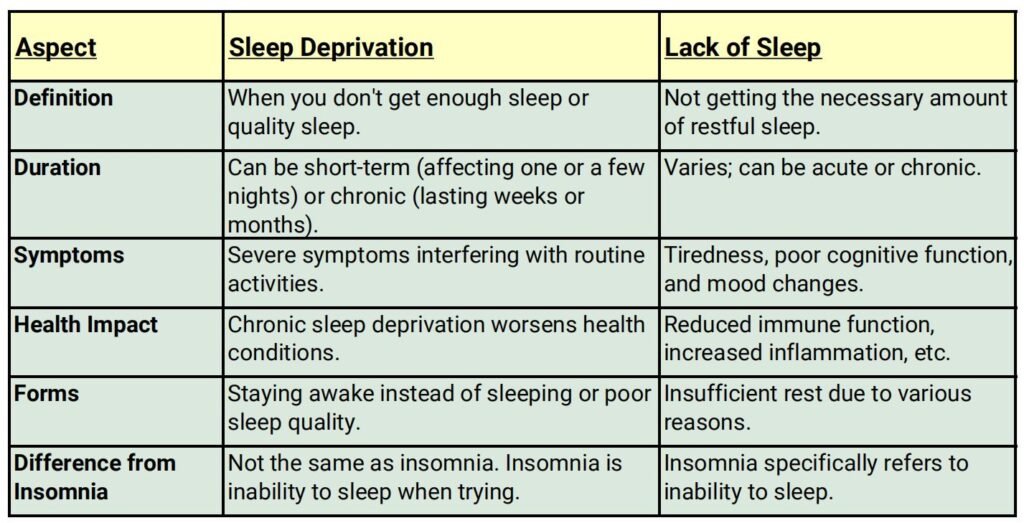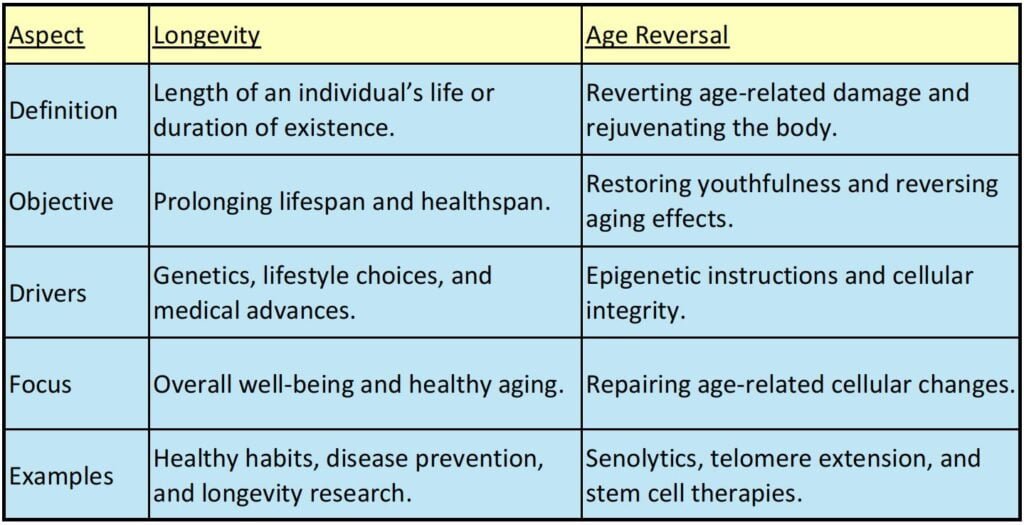Understanding Longevity and Age Reversal
Introduction
Longevity is not just about living a long life span, as it is commonly understood, but about living a fulfilling and vibrant life for as long as possible. In this blog post, we will explore the concept of longevity and discuss various strategies and approaches to promoting age reversal.
The Science of Longevity
Longevity is a complex topic encompassing various factors, including genetics, lifestyle choices, and environmental influences. While genetics play a role in determining our life span, research has shown that lifestyle factors can significantly impact our longevity.
Studies have found that adopting a healthy lifestyle, which includes regular exercise, a balanced diet, stress management, and adequate sleep, can promote longevity. These lifestyle choices improve physical health and contribute to mental well-being, which is crucial for longevity.
Recently, some scientists have started classifying”Aging as a disease.” Initial steps to cure Aging as a disease have already started. Age reversal refers to slowing down or reversing the effects of aging on the body, organs, and the brain.
While, for now, it is impossible to halt the aging process completely, several strategies can help slow its progression and promote a more youthful appearance and vitality. The best possible scenario is to make Healthspan be made equal to a long lifespan.
Age Reversal
1.Healthy Diet
A healthy diet plays a key role in promoting age reversal. Its not just about eating healthy diet but also consciously avoiding unhealthy and processed food.
Consuming a variety of nutrient-rich foods, such as fruits, vegetables, whole grains, lean proteins, and healthy fats, can provide the body with essential vitamins, minerals, and antioxidants that help combat the effects of aging.

Antioxidants, in particular, are known for their anti-aging properties. They help neutralize harmful free radicals in the body. Foods rich in antioxidants include berries, leafy greens, nuts, and seeds.
2.Regular Exercise
Regular exercise is another crucial component of age reversal. Physical activity helps maintain a healthy weight and cardiovascular health and promotes muscle strength and flexibility, which tend to decline with age.

Combining cardiovascular exercises, strength training, and flexibility exercises can help slow aging and improve overall physical function. Finding activities you enjoy and making exercise a regular part of your routine is important.
3.Managing Stress
Chronic stress can have detrimental effects on both physical and mental health, accelerating the aging process. Therefore, effective stress management techniques are essential for promoting age reversal.
In an article titled “Daily healthy habits to reduce stress and increase longevity,” Kristy Dyer (March 2023, Science Direct) emphasized Daily Healthy Lifestyle habits, which contribute to reducing all mortality-related diseases and markers.
Meditation, deep breathing exercises, yoga, and mindfulness can help reduce stress levels and promote relaxation. It is important to find healthy coping mechanisms that work for you and incorporate them into your daily routine.
4.Optimum Sleep

Optimal sleep is crucial for Health and Longevity. Sleep allows our brain to recharge and process memories. It enhances focus, concentration, and cognitive abilities. One cannot achieve worthwhile results if Optimum sleep is not maintained.
Here are some of the reasons for it.
4.1 Cognitive Functions:
Sleep is necessary for optimal cognitive function, including memory, attention, and decision-making. Chronic sleep deprivation can lead to cognitive decline and an increased risk of neurodegenerative diseases such as Alzheimer’s, loss of memory, faster aging, and a deteriorating quality of life.
4.2 Stress Reduction:
It goes without saying that stress is an important factor in increasing all-cause mortality in humans.
Sleep is a natural stress reducer. Sleep deprivation leads to chronic stress and can lead to a variety of health problems, including chronic inflammation in the body that is the primary reason for heart disease, diabetes, and depression.
4.3 Repair & Restoration
Repair and Restoration of Body Cells and Tissues: During sleep, the body supports healthy brain function and maintains physical health. It is also when the body repairs heart blood vessels and overhauls the circulatory system to heal damaged cells.
4.4 Hormone Regulation:
Sleep affects the production of hormones that regulate appetite, metabolism, and stress. Lack of sleep can lead to weight gain, insulin resistance, and increased stress levels, all of which are risk factors for many chronic diseases.
4.5 Immune Function:
Sleep is essential for a healthy immune system. Lack of sleep can increase the risk of infections and chronic diseases such as heart disease, diabetes, and cancer.
4.6 Sleep Deprivation :
Sleep Deprivation leads to a vicious cycle of ill health and body inflammation and increases the rate of aging. It makes the skin lose its elasticity and collagen faster; thus, speed-depraved skin looks coarse and tired.
4.6.1 Prevalence and Impact
Insufficient sleep is a pervasive and prominent problem in our modern 24-hour society. A considerable body of evidence suggests that insufficient sleep causes a host of adverse medical and mental dysfunctions. Let’s explore this critical issue and its implications.
4.6.2 The Impact of Lack of Sleep:
Health Consequences: Chronic insufficient sleep is associated with:
- Cardiovascular Diseases: Increased risk of heart disease, hypertension, and stroke.
- Metabolic Disorders: Altered glucose metabolism and obesity.
- Mental Health: Anxiety, depression, and impaired cognitive function.
- Immune System Dysfunction: Reduced immune response.
- Accidents and Errors: Impaired alertness leading to accidents at work or while driving.
Sleep deprivation & Lack of sleep: A Comparison

Artificial and Replaceable Organs:
In recent years, remarkable progress has been made in artificial and replaceable organ therapy. These innovations aim to enhance quality of life, extend survival, and address organ shortages. Key advancements include:
- Bioprinting and Tissue Engineering: Scientists are developing methods to create functional organs using 3D bioprinting. Layering living cells can construct tissues like skin, cartilage, and even small-scale organs.
- Organ-on-a-Chip Technology: Miniaturized devices simulate the behavior of specific organs, allowing researchers to study drug responses, disease mechanisms, and personalized treatments.
- Immunosuppression Improvements: Transplant recipients benefit from better immunosuppressive drugs, reducing rejection risks and improving long-term outcomes.
- Bioartificial Kidneys: Researchers are designing implantable bioartificial kidneys that mimic natural kidney function, potentially replacing dialysis.
- Neural Prosthetics: Brain-computer interfaces enable communication between the brain and external devices, aiding paralyzed individuals and amputees.
- Gene Editing and Regeneration: Techniques like CRISPR allow targeted modification of genes, promoting tissue regeneration and repair.
These advancements hold immense promise for patients awaiting transplants and those with organ dysfunction. As research continues, we move closer to a future where replaceable organs are more accessible and effective.
Sleep Deprivation Pendamic
Insufficient sleep is not merely an individual concern; it has far-reaching consequences for public health. Recognizing its seriousness, we must prioritize sleep hygiene, raise awareness, and implement strategies to improve sleep quality globally.
Regular and optimum sleep is essential for overall health and well-being and is a critical component of any longevity strategy a man can strategize.
In the End…
Longevity is not just about living a long life span but about living a vibrant and fulfilling life for as long as possible. By adopting a healthy lifestyle, incorporating age-reversal strategies, and taking care of our physical and mental well-being, we can enhance our longevity and enjoy quality youthful life as we age.
Age Reversal: Unlocking the Fountain of Youth
What Is Age Reversal?
Imagine a magical process that could turn back the clock on your body, making you feel and function like a younger version of yourself. That’s the essence of age reversal. It’s not science fiction; scientists are actively researching ways to slow down or even reverse the effects of aging.
Why Is Aging a Big Deal?
Aging is a natural process, but it comes with some downsides:
- Cellular Wear and Tear: Over time, our cells accumulate damage. Think of it like wear and tear on a car—eventually, things start breaking down.
- Health Challenges: As we age, we become more susceptible to diseases like heart disease, cancer, and dementia.
- Slower Recovery: Ever notice how it takes longer to recover from a workout or a late night as you get older? That’s because our bodies don’t bounce back as quickly.
The Cellular Culprits: Senescent Cells
One key player in aging is the senescent cell. These cells have stopped dividing and become “zombie” cells—still hanging around but not doing anything useful. Senescent cells release harmful substances that contribute to inflammation and tissue damage.
Age Reversal Strategies:
- Chemical Reprogramming:
- Scientists have found ways to reprogram senescent cells. They use specific chemical combinations to make these cells behave more like young, healthy cells.
- It’s like giving those zombie cells a pep talk: “Hey, remember when you were young and vibrant? Let’s get back to that!”
- Telomeres and Youthfulness:
- Telomeres are like protective caps on our chromosomes. They shorten as we age.
- Some researchers are exploring extending telomeres, effectively slowing down the aging clock.
- Stem Cells to the Rescue:
- Stem cells have incredible regenerative powers. They can repair damaged tissues.
- Scientists are investigating stem cell therapies to rejuvenate aging organs and tissues.
The Exciting Part: Human Trials
While most studies have been done on mice, there has been hope for human trials. We can slowly have a clearer picture of the future:
- Reverse Wrinkles: Smooth out those laugh lines and crow’s feet.
- Boost Energy: Feel as energetic as we did in our twenties.
- Fight Diseases: Keep our hearts, brains, and joints healthier for longer.
The Bottom Line
Age reversal isn’t about vanity; it’s about healthspan—living more years in good health. So, while we wait for the magic potion, let’s take care of ourselves: eat well, exercise regularly, and hopefully one day, science will catch up with our dreams of eternal youth until the day we die!
Comparison between Longevity & Age Reversal:

Research Papers
Here are some research papers that delve into the topic of insufficient sleep:
Sleep Deprivation and Deficiency – What Are Sleep Deprivation and Deficiency? | NHLBI, NIH
“The Global Problem of Insufficient Sleep and Its Serious Public Health Implications” 2:
A comprehensive review that highlights the global impact of insufficient sleep. It discusses the public health implications and provides insights into potential interventions.
“A Narrative Review of the Literature on Insufficient Sleep and Insomnia” 3:
This review focuses on the prevalence, correlates, predictors, and treatment of insufficient sleep and insomnia. It sheds light on health disparities related to sleep.
“Sleep Quality in Students: Associations with Psychological and Lifestyle Factors” 4:
A cross-sectional study examining subjective sleep quality in university students. It explores how psychological and lifestyle factors relate to sleep patterns.
Further reading about sleep:
Why Do We Need Sleep? (sleepfoundation.org)
More about age reversal:
Study Results Suggest Human Aging Can Be Reversed | Lifespan.io
